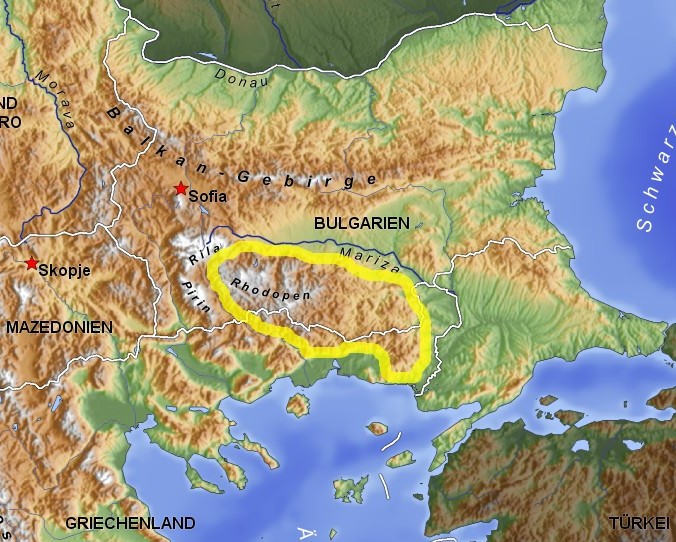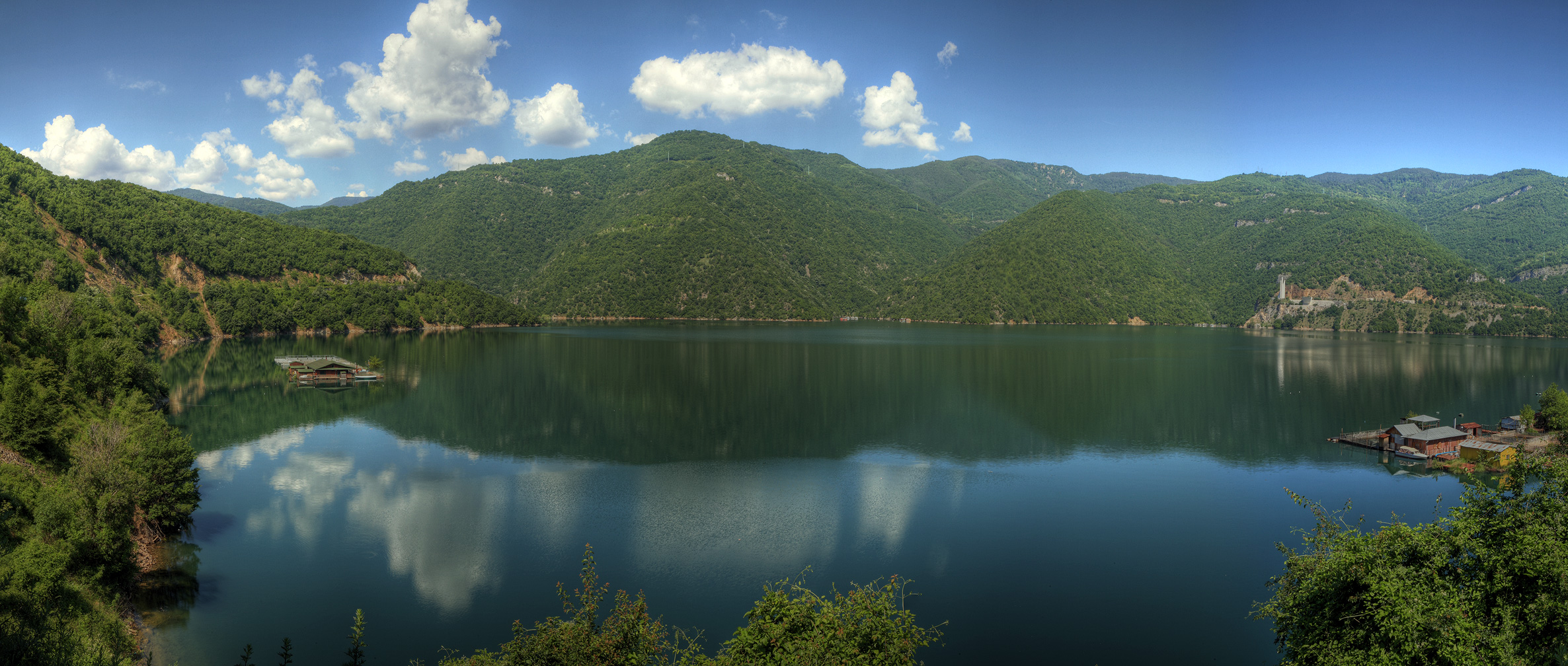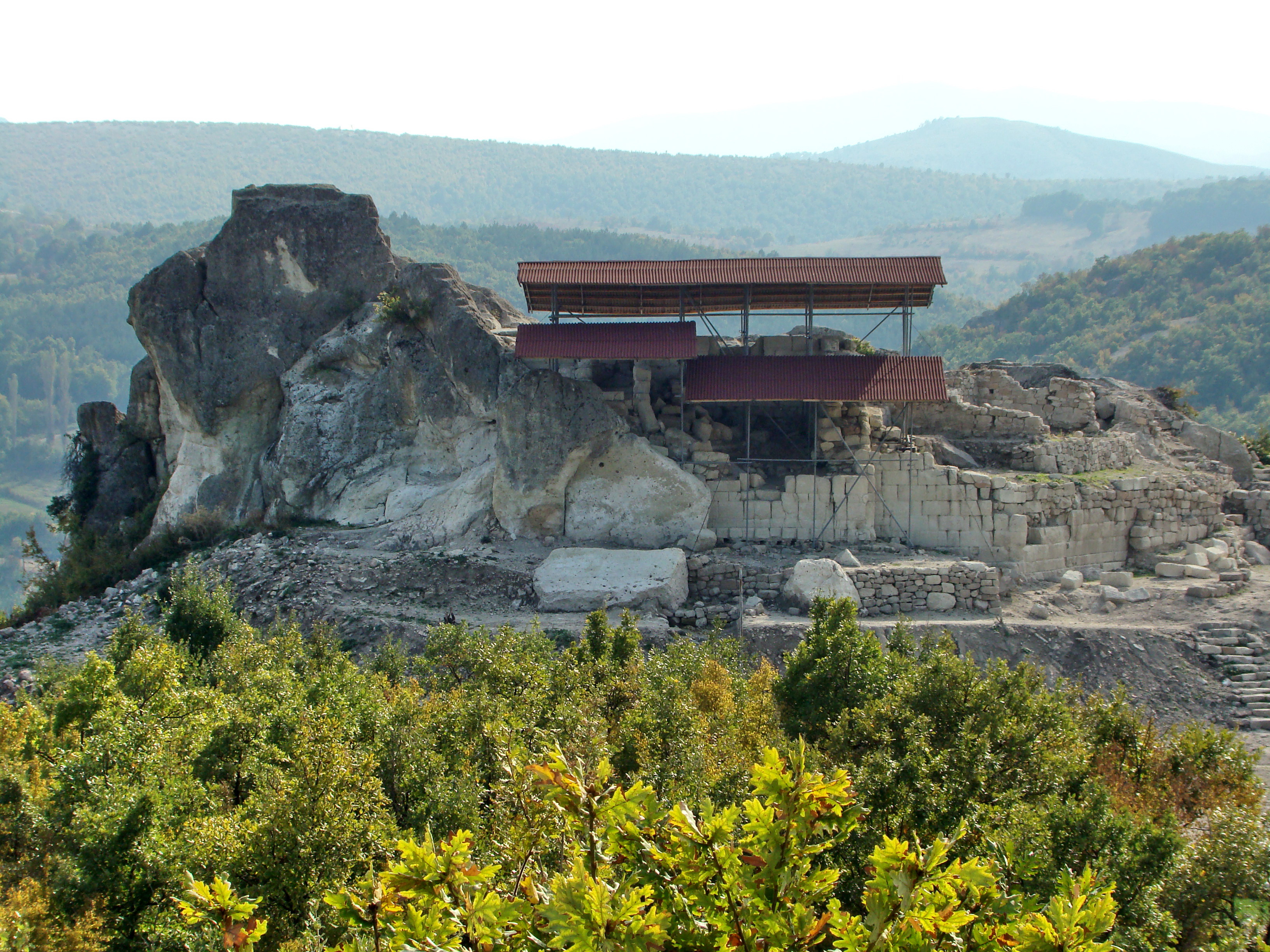|
Rhodope Mountains
The Rhodopes (; bg, Родопи, ; el, Ροδόπη, ''Rodopi''; tr, Rodoplar) are a mountain range in Southeastern Europe, and the largest by area in Bulgaria, with over 83% of its area in the southern part of the country and the remainder in Greece. Golyam Perelik is its highest peak at . The mountain range gives its name to the terrestrial ecoregion Rodope montane mixed forests that belongs in the temperate broadleaf and mixed forests biome and the Palearctic realm. The region is particularly notable for its karst areas with their deep river gorges, large caves and specific sculptured forms, such as the Trigrad Gorge. A significant part of Bulgaria's hydropower resources are located in the western areas of the range. There are a number of hydro-cascades and dams used for electricity production, irrigation, and as tourist destinations. In Greece, there are also the hydroelectric power plants of Thisavros and Platanovrysi. The Rhodopes have a rich cultural heritage includ ... [...More Info...] [...Related Items...] OR: [Wikipedia] [Google] [Baidu] |
Vacha Reservoir
Vacha Reservoir ( Yazovir Vacha; before 1999: Antonivanovtsi Reservoir) is a body of water associated with a dam in Devin Municipality, south Bulgaria. It is part of the Vacha Cascade Joint Implementation Project involving three more dams and four power stations. The three other existing dams on the Vacha River are the Krichim Dam, the Tsankov Kamak Dam and the Teshel Dam. Completed on 5 November 1975, the Vacha Dam is situated above sea level. The dam was designed by Bulgarian hydroengineers, though their work was overseen by Russian, Japanese and Italian experts. It is a concrete gravity structure of height, making it the tallest dam in Bulgaria together with Krichim Dam. Its pumped storage power plant has a capacity of 160 MW. History The potential of hydroelectric projects on the Vacha River in southern Bulgaria was recognized by the Bulgarian government at least as early as the early 1960s. The June 1962 edition of ''Water Power'' stated that the dam was "scheduled to add ... [...More Info...] [...Related Items...] OR: [Wikipedia] [Google] [Baidu] |
Tatul
Tatul ( bg, Татул, the local name for ''Datura stramonium'') is a village in Momchilgrad municipality, Kardzhali Province located in the Eastern Rhodopes in southern Bulgaria. It is lies at 319 m above sea level at , 15 km east of Momchilgrad, and has a population of 189 people. Most of the houses were built of well-cut stone blocks. In the 2000s Bulgarian archaeologists discovered an ancient Thracian surface tomb and sanctuary in the immediate proximity of the village, and it was soon recognized as an exclusive religious center in the region of importance to the whole region according to head archaeologist Nikolay Ovcharov. Latest archaeological finds date the earliest settlement to 4000 BC. According to Ovcharov, the site is the sanctuary and tomb of an influential Thracian leader who was deified after his death. He also links it with the cult of Orpheus.Овчаров, Николай. Новооткритото светилище при с. Татул, Мом ... [...More Info...] [...Related Items...] OR: [Wikipedia] [Google] [Baidu] |
Middle Ages
In the history of Europe, the Middle Ages or medieval period lasted approximately from the late 5th to the late 15th centuries, similar to the post-classical period of global history. It began with the fall of the Western Roman Empire and transitioned into the Renaissance and the Age of Discovery. The Middle Ages is the middle period of the three traditional divisions of Western history: classical antiquity, the medieval period, and the modern period. The medieval period is itself subdivided into the Early Early may refer to: History * The beginning or oldest part of a defined historical period, as opposed to middle or late periods, e.g.: ** Early Christianity ** Early modern Europe Places in the United States * Early, Iowa * Early, Texas * Early ..., High Middle Ages, High, and Late Middle Ages. Population decline, counterurbanisation, the collapse of centralized authority, invasions, and mass migrations of tribes, which had begun in late antiquity, continued i ... [...More Info...] [...Related Items...] OR: [Wikipedia] [Google] [Baidu] |
The Independent
''The Independent'' is a British online newspaper. It was established in 1986 as a national morning printed paper. Nicknamed the ''Indy'', it began as a broadsheet and changed to tabloid format in 2003. The last printed edition was published on Saturday 26 March 2016, leaving only the online edition. The newspaper was controlled by Tony O'Reilly's Irish Independent News & Media from 1997 until it was sold to the Russian oligarch and former KGB Officer Alexander Lebedev in 2010. In 2017, Sultan Muhammad Abuljadayel bought a 30% stake in it. The daily edition was named National Newspaper of the Year at the 2004 British Press Awards. The website and mobile app had a combined monthly reach of 19,826,000 in 2021. History 1986 to 1990 Launched in 1986, the first issue of ''The Independent'' was published on 7 October in broadsheet format.Dennis Griffiths (ed.) ''The Encyclopedia of the British Press, 1422–1992'', London & Basingstoke: Macmillan, 1992, p. 330 It was prod ... [...More Info...] [...Related Items...] OR: [Wikipedia] [Google] [Baidu] |
Orpheus
Orpheus (; Ancient Greek: Ὀρφεύς, classical pronunciation: ; french: Orphée) is a Thracians, Thracian bard, legendary musician and prophet in ancient Greek religion. He was also a renowned Ancient Greek poetry, poet and, according to the legend, travelled with Jason and the Argonauts in search of the Golden Fleece, and even descended into the Underworld of Hades, to recover his lost wife Eurydice. Ancient Greek authors as Strabo and Plutarch note Orpheus's Thracians, Thracian origins. The major stories about him are centered on his ability to charm all living things and even stones with his music (the usual scene in Orpheus mosaics), his attempt to retrieve his wife Eurydice from the Greek underworld, underworld, and his death at the hands of the maenads of Dionysus, who tired of his mourning for his late wife Eurydice. As an archetype of the inspired singer, Orpheus is one of the most significant figures in the classical reception studies, reception of classical myth ... [...More Info...] [...Related Items...] OR: [Wikipedia] [Google] [Baidu] |
Hera
In ancient Greek religion, Hera (; grc-gre, Ἥρα, Hḗrā; grc, Ἥρη, Hḗrē, label=none in Ionic and Homeric Greek) is the goddess of marriage, women and family, and the protector of women during childbirth. In Greek mythology, she is queen of the twelve Olympians and Mount Olympus, sister and wife of Zeus, and daughter of the Titans Cronus and Rhea. One of her defining characteristics in myth is her jealous and vengeful nature in dealing with any who offend her, especially Zeus' numerous adulterous lovers and illegitimate offspring. Her iconography usually presents her as a dignified, matronly figure, upright or enthroned, crowned with a '' polos'' or diadem, sometimes veiled as a married woman. She is the patron goddess of lawful marriage. She presides over weddings, blesses and legalises marital unions, and protects women from harm during childbirth. Her sacred animals include the cow, cuckoo and the peacock. She is sometimes shown holding a pomegranate, ... [...More Info...] [...Related Items...] OR: [Wikipedia] [Google] [Baidu] |
Zeus
Zeus or , , ; grc, Δῐός, ''Diós'', label=genitive Boeotian Aeolic and Laconian grc-dor, Δεύς, Deús ; grc, Δέος, ''Déos'', label=genitive el, Δίας, ''Días'' () is the sky and thunder god in ancient Greek religion, who rules as king of the gods on Mount Olympus. His name is cognate with the first element of his Roman equivalent Jupiter.''Larousse Desk Reference Encyclopedia'', The Book People, Haydock, 1995, p. 215. His mythology and powers are similar, though not identical, to those of Indo-European deities such as Jupiter, Perkūnas, Perun, Indra, Dyaus, and Zojz. Entry: "Dyaus" Zeus is the child of Cronus and Rhea, the youngest of his siblings to be born, though sometimes reckoned the eldest as the others required disgorging from Cronus's stomach. In most traditions, he is married to Hera, by whom he is usually said to have fathered Ares, Eileithyia, Hebe, and Hephaestus. At the oracle of Dodona, his consort was said to be Dione, by whom ... [...More Info...] [...Related Items...] OR: [Wikipedia] [Google] [Baidu] |
Haemus
In Greek mythology, King Haemus (; , ''Haîmos'') of Thrace, was the son of Boreas, the north wind. Mythology Haemus was vain and haughty and compared himself and his wife, Queen Rhodope, to Zeus and Hera. The gods changed him and his wife into mountains (respectively Haemus Mons, now known as the Balkan Mountains, and the Rhodope Mountains). In ancient Greek Ancient Greek includes the forms of the Greek language used in ancient Greece and the ancient world from around 1500 BC to 300 BC. It is often roughly divided into the following periods: Mycenaean Greek (), Dark Ages (), the Archaic p ..., the Balkan Peninsula was thus known as the "Peninsula of Haemus" (), a name which retains some currency in modern Greek. Another classic etymology derives the name 'Haemos' from the myth about the fight of Zeus and the dragon Typhon: :He was again driven to Thrace and hurled entire mountains at Zeus in the battle around Mount Haemus. When these bounced back upon him ... [...More Info...] [...Related Items...] OR: [Wikipedia] [Google] [Baidu] |
Thrace
Thrace (; el, Θράκη, Thráki; bg, Тракия, Trakiya; tr, Trakya) or Thrake is a geographical and historical region in Southeast Europe, now split among Bulgaria, Greece, and Turkey, which is bounded by the Balkan Mountains to the north, the Aegean Sea to the south, and the Black Sea to the east. It comprises southeastern Bulgaria ( Northern Thrace), northeastern Greece (Western Thrace), and the European part of Turkey (East Thrace). The region's boundaries are based on that of the Roman Province of Thrace; the lands inhabited by the ancient Thracians extended in the north to modern-day Northern Bulgaria and Romania and to the west into the region of Macedonia. Etymology The word ''Thrace'' was first used by the Greeks when referring to the Thracian tribes, from ancient Greek Thrake (Θρᾴκη), descending from ''Thrāix'' (Θρᾷξ). It referred originally to the Thracians, an ancient people inhabiting Southeast Europe. The name ''Europe'' first referred ... [...More Info...] [...Related Items...] OR: [Wikipedia] [Google] [Baidu] |
Queen Rhodope
In Greek mythology, Rhodope (Ancient Greek: Ῥοδόπη) may refer to two different characters: * Rhodope, one of the 3,000 Oceanids, water-nymph daughters of the Titans Oceanus and his sister-wife Tethys. She was one of the playmates of Persephone in the meadows of Sicily when the latter was abducted by her uncle Hades to be his queen in the underworld. * Rhodope, a queen of Thrace and the wife of King Haemus. The latter was vain and haughty and compared himself and Rhodope to Zeus and Hera, who were offended and changed the couple into mountains (the Balkan mountains and Rhodope mountains, respectively). This Rhodope may be one who was called the daughter of Strymon who consorted with Poseidon and became the mother of Athos.Scholia on Theocritus, ''Idyll'' 7.76 Notes References * Gaius Julius Hyginus, ''Fabulae from The Myths of Hyginus'' translated and edited by Mary Grant. University of Kansas Publications in Humanistic StudiesOnline version at the Topos Text Projec ... [...More Info...] [...Related Items...] OR: [Wikipedia] [Google] [Baidu] |
Greek Mythology
A major branch of classical mythology, Greek mythology is the body of myths originally told by the ancient Greeks, and a genre of Ancient Greek folklore. These stories concern the origin and nature of the world, the lives and activities of deities, heroes, and mythological creatures, and the origins and significance of the ancient Greeks' own cult and ritual practices. Modern scholars study the myths to shed light on the religious and political institutions of ancient Greece, and to better understand the nature of myth-making itself. The Greek myths were initially propagated in an oral-poetic tradition most likely by Minoan and Mycenaean singers starting in the 18th century BC; eventually the myths of the heroes of the Trojan War and its aftermath became part of the oral tradition of Homer's epic poems, the '' Iliad'' and the '' Odyssey''. Two poems by Homer's near contemporary Hesiod, the '' Theogony'' and the '' Works and Days'', contain accounts of the genes ... [...More Info...] [...Related Items...] OR: [Wikipedia] [Google] [Baidu] |
Sofia University
Sofia University, "St. Kliment Ohridski" at the University of Sofia, ( bg, Софийски университет „Св. Климент Охридски“, ''Sofijski universitet „Sv. Kliment Ohridski“'') is the oldest higher education institution in Bulgaria. Founded on 1 October 1888, the edifice of the university was constructed between 1924 and 1934 with the financial support of the brothers Evlogi Georgiev and Hristo Georgiev (whose sculptures are now featured on its façade) and has an area of 18,624 m2 and a total of 324 premises. The university has 16 faculties and three departments, where over 21,000 students receive their education. The current rector is Anastas Gerdzhikov. It has been consistently ranked as the top university in Bulgaria according to national and international rankings, being constantly among the best four percent of world universities according to ''QS World University Rankings''. History The university was founded on 1 October 1888— ... [...More Info...] [...Related Items...] OR: [Wikipedia] [Google] [Baidu] |




_Pompeian_Art.jpg)



